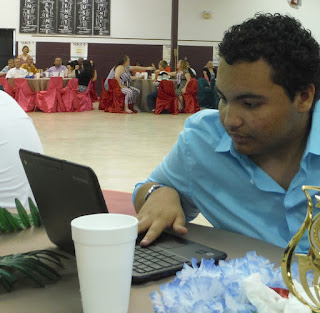Autism and Eye Contact
Most people take for granted the role eye contact plays with social interaction. To the child on the autism spectrum, however, the value or understanding of eye contact may prove elusive. It is a factor that has an interesting effect on the lives of children and families.
One of the first warning signs that can alert parents to the possible presence of autism is poor eye contact. This is of particular concern for young children after 2 years of age. The first instinct of many parents is to presume that the child has a hearing problem. The child may not respond to his name until after several attempts. Following an autism diagnosis, parents come to understand how eye contact is used or avoided by the child.
 |
| Eye Contact |
Eye contact, among other factors, also comes into play as the child gets older. Other children will be encountered at a park, school or public event. The typically developing child that approaches the autistic child in an attempt to make friends is likely to feel snubbed. This occurs through a combination of eye contact avoidance and little or no verbal response from the autistic child.
Parents and therapists will need to develop eye contact skills the best way they can. This can be through motivational or reward techniques. The child may eventually learn to equate speaking with eye contact and respond accordingly. This of course depends on the severity of the case of autism and traits of the individual child.
In the case of my son, his eye contact has improved greatly over the years. Regardless of improvements, there most likely will always be certain moments that he resists eye contact. It is simply an uncomfortable thing for him to do at times. Ultimately the goal will be for him not to enjoy eye contact, but to use it as a life skill when social situations arise.
Autism themed books by Mark Ferdinand. Fiction and nonfiction:
Fortune on the Spectrum
Denny
was diagnosed with autism at three years of age. Autism gave him the
gift of obsession. This gift made him the youngest, self-made
millionaire in Texas history. Autism also made him vulnerable to the
forces of the outside world, of both society and nature. Fortune on the
Spectrum is the journey of an unstoppable young man, destined to
succeed and challenged to survive. Denny's story takes you through
struggle, humor, love, finance and danger from the voice of an atypical
mind. Autism Fiction. Texas Novel.
The Autistic Prankster: Enjoying the Fun Side of Autism
We
know about all the challenges. These stories focus on the fun and the
funny side of autism. While he may not have typical communication
skills, surprisingly this can be an asset in the humor department. Funny
autism-related moments are a daily occurrence with this young
character, and this book is a collection of the most memorable.
Books by Mark Ferdinand
- Fortune on the Spectrum –An Adventure Novel
- You’re Gonna’ Get Bit! –Harrowing Tales of Herpetology
- The Autistic Prankster –Enjoying the Fun Side of Autism
- Every Tiki has a Spirit
- Wild Boar: A Case for the Most Beautiful Game Animal





